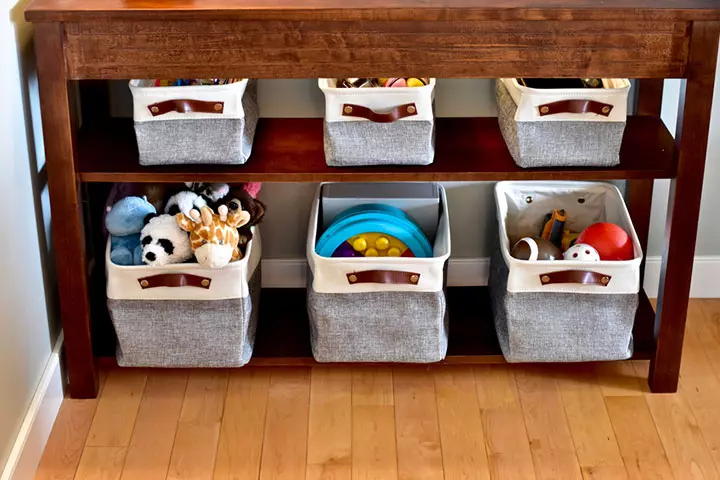
Image: ShutterStock
One would often find that brother and sister share a bedroom in smaller homes. Sharing bedrooms is a space adjustment idea and a great way to help siblings bond together. Many think it is not feasible for siblings of the opposite gender to live in the same bedroom. However, sharing a bedroom can be possible until a certain age. Moreover, this adjustment can often prove to be beneficial. Brothers and sisters who share a divided space in a room learn to cohabit, share their things, respect each other’s privacy, and adjust to their differences. This post gives you some tips about creating a wonderful experience for brothers and sisters of a family who share their bedrooms.
Key Pointers
- Sharing a bedroom with your sibling is okay when there is a space constraint at your home, provided you respect each other’s privacy.
- While there is no age restriction, most people feel they need their own space after 12.
- Implement certain mutual rules, have your separate schedules and storage spaces, maintain good communication with your siblings to enjoy the experience of staying together.

Image: IStock
It is okay for siblings of opposite genders to share a bedroom. A brother and sister may have different interests, and so there will be fewer chances of fights between them over sharing stuff. Living together can strengthen their bond and help them make beautiful memories together.
But for older children, especially those approaching puberty, you need to talk with them about understanding and respecting each other’s privacy. They will have to create boundaries specifying their respective private areas of the room.
As long as children know their boundaries and are comfortable sharing a room, there should be no problem going ahead with a room-sharing arrangement.
What Is The Ideal Age For A Brother And Sister To Start And Stop Sharing A Bedroom?
There is no age limit for sharing a room between brother and sister. However, they would like to have their own space when they are 10 or 12 years old.
The arrangement helps them get closer as siblings. However, siblings with a wide age gap could have frequent conflicts as their schedules of sleeping, studying, and other activities may differ. Also, the older sibling may need more privacy. Sometimes, an older sibling may not enjoy sharing a room with a younger one. In such cases, you may consider some additional arrangements, such as installing a separator in the room to divide the room. For brothers and sisters with a less age gap, sharing a room might not be a hassle.
Angathome, a mother of seven, shares her approach to having babies share rooms. She says, “Some people say that having children sharing right from the beginning eliminates many problems. We have never done this, always having our babies in their own rooms so that they do not disturb other children when waking for feed. Each child has transitioned to a big bed around the 2-year mark (a few months before the next baby arrives) and so far we have always had the luxury of this being in their own room. We can then work on staying in bed, morning routines, and all the rest without disturbing older children. They shift into shared arrangements somewhere between 3 and 5, depending on the arrival of subsequent babies! We will eventually run out of space to do this but so far so good (i).”
Having siblings share a room can be a great idea and a practical solution to situations when space is a constraint. But it can get a little challenging when siblings do not get along. Here are some ways to help your children get comfortable sharing a bedroom.
1. Establish ground rules
Set some ground rules for both the children to follow. Ensure each of them has their personal space and enjoys the personal time. Ask them to respect each other’s space. This way, they will learn to share a space and work within set boundaries.
2. Create personal schedules
Each child may have specific timings to sleep, study, and play. Create a daily schedule for them. Divide items such as books and toys accordingly. They can take turns and play the game as per their schedule. It helps them learn the importance of time.
 Point to consider
Point to consider3. Facilitate for white noise
After you fix a sleeping time for your children, ensure that they are in bed by that time. If one child’s sleeping habits such as grinding teeth or snoring disturb the other, play soothing music or an audiobook to help them fall asleep.
4. Separate space for storing personal belongings

Image: Shutterstock
To keep your children from fighting over personal belongings, divide the belongings and make separate storage spaces. Each should have a different wardrobe that they need to clean and organize at least once a week. It will teach them to be responsible for their things.
5. Allocate separate space for some quiet time
Reserve a separate space or room for quiet activities such as studying, artwork, and meditation. Allow them to indulge in noisy activities such as playing games or learning musical instruments in the living room or any other common area.
 Quick tip
Quick tip6. Inculcate the sharing habit
Along with respecting each other’s privacy, children need to learn the importance of sharing. Staying in the same room will help in teaching children to share their space and belongings from a young age. They should be kind to others and know to value the things they receive. Teach them to take care of things that do not belong to them.
7. Allow individual space decoration

Image: IStock
When you have siblings of the opposite gender sharing the room, ensure the room décor is gender-neutral. However, they can decorate their personal spaces such as their bed, study area, and wall as per their choice. Give them space and scope to develop their creativity and promote their interests.
8. Talk with the older child
If the age gap between the siblings is quite a few years, talk to the older child about the arrangement. They might not be ready to share the room for privacy or because of the younger one’s disturbance. You need to explain how the room sharing arrangement is important for their growth and ask them to be a little more adjusting and accommodative of their younger sibling.
9. Make room adjustments
If your children tend to fight, divide the space and place a room separator between their beds. Instead of dividing the furniture, such as closet, drawer, shelf, and wardrobe, let them have individual furniture, a computer, and a shelf. It can be a win-win arrangement.
10. Help resolve conflicts

Image: IStock
No matter how well-behaved and cooperative your children are, there will be instances of conflict. During such times, handle the situation patiently. Avoid taking sides and come up with an amicable solution. Ensure that they eventually go to bed peacefully without holding any resentment toward each other.
 Did you know?
Did you know?Frequently Asked Questions
1. Do siblings who share a bedroom tend to have better communication skills?
One advantage of sharing a space with siblings is that it strengthens their relationship and helps them better understand one another. It also encourages communication, whether it be talking about school or a football game, and as a result, they tend to get to know one another better, which will help them in the long run.
2. Can siblings who share a bedroom be more empathetic toward each other?
Siblings who share a bedroom develop respect for one another. They gain compassion and tolerance for one another. Sharing a bedroom also means sharing other things; they eventually become empathetic with one another.
3. How can siblings maintain privacy when sharing a bedroom?
The room can be divided to ensure that both children get equal space for their belongings. Use large pieces of furniture or decorative room dividers to create separate spaces. In addition, curtains above the bed can provide some privacy while adding an aesthetic appeal. Encouraging quiet activities and quiet time is also beneficial for maintaining privacy.
4. What kind of sleeping arrangements can I use when children share a bedroom?
You may keep the beds of the siblings as far apart from each other as possible so that no one gets disturbed. Use bunk, loft, or trundle beds to maximize floor space and make room for personal belongings and comfort. However, consider the sleeping preferences of your children and then use the space available in the room accordingly.
Sharing a bedroom is not only a space-saving idea but also a great way to promote strong bondings. In many houses, a brother and sister share a bedroom at a young age. However, as they reach puberty, most brothers and sisters seek privacy. In this case, sharing a bedroom becomes tricky. They should be able to respect each other’s privacy and differences to share their bedrooms. Also, you need to make some adjustments in the room so that both can create a comfortable personal space. So, if you want siblings to share a room, ensure you make some clear rules, give them separate storage, allow personal space decoration, and help resolve conflicts. Although children can start sharing their rooms at any age, it would be better to start early because older children may need more time to adjust to each other.
Infographic: Pros And Cons Of Siblings Sharing A Room
Siblings have a unique and special bond with each other. They may not share their belongings but will do anything to protect and support each other. So when they share a room, things can be both fun and challenging at times. It may bring them closer and understand each other better but may lead to conflicts too from the difference of opinions.
Check this infographic out to learn about the pros and cons of sibling-shared rooms and some creative decorating ideas to make the sharing easier. Illustration: Momjunction Design Team

Image: Dall·E/MomJunction Design Team
Sharing a bedroom with your sibling can be a challenge, but it doesn’t have to be! Delve into the depth of privacy concerns through this helpful video.
Personal Experience: Source
MomJunction articles include first-hand experiences to provide you with better insights through real-life narratives. Here are the sources of personal accounts referenced in this article.
i. Sharing bedrooms; pros and conshttps://angathome.com/2014/04/28/sharing-bedrooms-pros-and-cons/
Community Experiences
Join the conversation and become a part of our nurturing community! Share your stories, experiences, and insights to connect with fellow parents.
Read full bio of Catherine Mok
Read full bio of Ratika Pai
Read full bio of Akshay Nair
Read full bio of Apoorva K





















